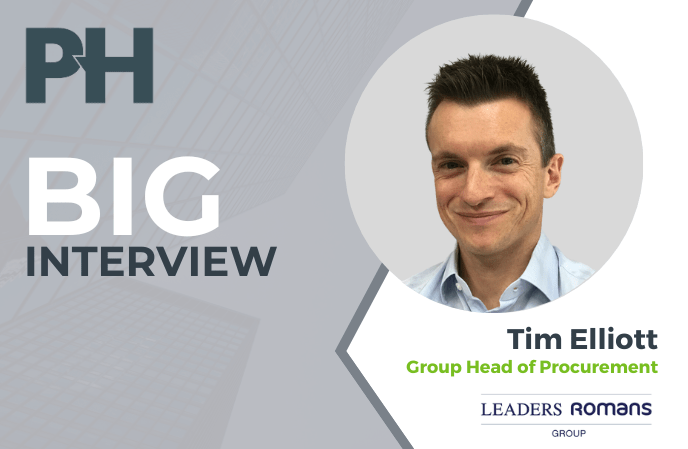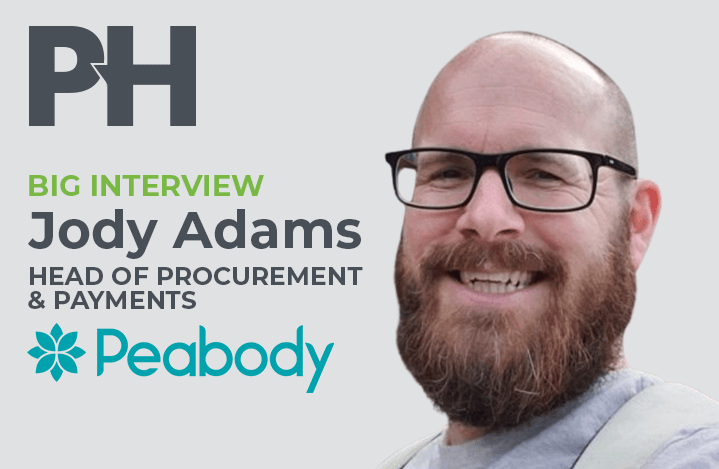Procurement Insights | In our latest Big Interview, Rupert Gaster spoke with Tim Elliott, Head of Procurement at Leaders Romans Group.
Join us as we unravel the intricate web of challenges and strategic endeavours that define procurement excellence in the supply chain.
You began your career 20 years ago as a music graduate at Southampton University, which led to a 15-year Procurement career spanning 3 continents, and now brings you to your current role as Head of Procurement of Leaders Romans Group.
My journey from a music graduate at Southampton University to the Head of Procurement at Leaders Romans Group is a testament to the unpredictable yet rewarding nature of career paths.
Music to Procurement doesn’t naturally follow, does it? Albeit music and maths do.
When I did go to see the careers councillor, I said I think I’m going to end up in the corporate world, but I really love music. She said to me, go and do what you love at university. Do well at it, and that will open more doors.
She was spot on. But in terms of how I got into procurement, ironically, I started work at BMW in sales when I graduated; that was a really good experience.
I quickly realised that I didn’t like sales, I liked numbers. I became aware that I was much more interested in how the cars got there and how they were procuring them, in both new and used cars.
So that was my initial journey into Procurement. I applied to other graduate schemes and because I had a good degree level, the subject didn’t matter. I attended a few interviews and ended up joining Tesco on their graduate scheme, back in 2005.
Considering the function of your role, what responsibilities does procurement hold within your business? How do you navigate this leadership position?
My role takes care of the goods and services, not for resale in the business. However, there are not always decisive lines here. I often have projects that cross over.
In essence, when looking at Romans Group, we are an estate agency business who have 270 sites in sales and lettings. We also undertake a wide vertical of property services, from surveys and mortgages to auctions.
We have 3000 colleagues now, which is a lot of people to be working with. My role typically focuses on indirect spend. That said, there are also some middle-ground elements such as marketing, IT, facilities, and professional services.
What are the challenges that you are currently facing?
There are the obvious challenges, like lack of talent. And of course, inflation is a huge challenge for us.
However, the biggest challenge I’ve faced so far is that we didn’t (previously) have an indirect procurement function, or people looking after that spend. As a business, we look after c.£25 million of spend, yet no one took care of it from a strategic (procurement) point of view.
With this in mind, my personal challenge was around the education of procurement as a strategic function. This can often prove to be challenging since historically if you say procurement or purchasing, people tend to think that the sole purpose is to deliver savings.
Looking at the indirect procurement side of the business, it’s a tough world.
We have a variety of costs to think about including IT, suppliers, and marketing which can be difficult to balance financially. We must be strategic when reviewing our budgets, especially looking at income. Our business is underpinned by lettings, that’s our bread and butter, 60-75% of our revenue comes from lettings.
That said, with recent changes to legislation many landlords are leaving the sector because of the new policies enforced.
In answer to your question about current challenges, there seems to be a perfect storm at the moment, of government policy, heavy inflation, less supply in the housing sector and greater demand following the COVID-19 pandemic.
What are your key focus areas for procurement right now?
We don’t have a big team. I’ve got two people working alongside me. So, our biggest challenge, without question, is workload.
Our focus is to deliver a strategic and efficient plan. We’re currently coming to the end of a three-year plan that I put into place when I joined the business, so the key focus will be to ensure we are set up for the future.
Over the last 18 months, our function has become credible in the business. This credibility means we’re having a huge mixture of people approach us from the business, to ask for support on contracts and agreements. We will be ensuring that we are there to support the business in key decision-making processes, part of that will be making sure we have enough of our own internal resources to deliver results.
What are you most passionate about when it comes to procurement?
I just love people. Without question, this is at the top of my list.
The people piece is fantastic, it brings variety. And of course, procurement is underpinned by mathematics, which I love too; the numbers always tell the story. So yeah, for me that’s it. I love spending time with people. I never stop, never stand still.
With all that in mind, what do you look for when hiring?
I always look for people who can learn and adapt. Without question, that is my number one priority.
During my time at Tesco and in Hong Kong, for example, I had a couple of graduates come through my team. I specifically wanted to bring in a graduate, the reason being is they’re like sponges.
What I mean by that is they listen and learn; they generally want to crack on and try different things. So, for me, that is a great quality. I don’t want to work with people who think they know it all, that’s not my style; you need people who can, pivot, learn adapt.
Can you talk more about your own experiences throughout your career?
Having the opportunity to go to Hong Kong was massive. Absolutely life-changing.
If anyone gets the chance to do something abroad on a placement, I will wholeheartedly recommend they do it. It’s so valuable.
I’d say my current role has been probably the thing I’m most proud of in a professional sense. We want to change things for the better to deliver real change for the business. My first year was chaotic, but I wanted it to be chaotic. Getting stuck in, helping my colleagues and of course, trying to add value for our customers
What have you learned? What is the best lesson that you’d like to share with us?
Business is really about equality. I think about my early career and how I should have walked into an office with the director, and sometimes it felt like I was carrying my boots.
It can be daunting because you feel this person knows more than you. It can be easy to just do the ‘yes sir’ no sir’ despite what you think and just try and go and work it all out.
Reflecting on it now, I work with people who are junior to me or a lot less experienced perhaps are their roles, but it doesn’t have to feel like there is a wall there. So, my advice would be, when you’re working with other people, collaborate, be kind to each other and work with integrity.
Additionally, understand that people have different strengths and weaknesses and learn how to navigate this, particularly when working with senior people.
Tell us about Tim, what motivates you?
In the spare time that I can find, I’ve always done the usual stuff. I play football, I play golf, I play tennis, I go to the gym, I love running, so I love the sports side.
And obviously, music is big for me. I spend lots of time with the piano or songwriting with my kids. I love doing that.
Where does it stop, right? Travelling all the time? I’m a big believer in trying to embrace life, constantly doing new things and filling your time with things that are Richie.
I have no desire to just sit around at the weekends! Also, I think what I would say from a procurement perspective is of course the more you do outside of work in your life, the more you’ll find you have commonalities with the people you work with. And that really breaks down boundaries.
If you could give your younger self some advice, what would it be?
Take those leaps of faith and be driven.
If you are moving from somewhere else into procurement, don’t feel overwhelmed or not qualified or unable to do it, just get in and see people on the same level and working together to collaborate. If you’ve got the right attitude, you’ll succeed.






